Cancer Biology Major Students
Below are the Cancer Biology students who are a part of the larger integrated PhD Program.

Alicia
The mission of the Marusyk Lab is to understand the development of therapy resistance from eco-evolutionary angle, considering both changes occurring in tumor cells, as well as influences of the tumor microenvironment. My research focuses on understanding the evolutionary paths cancer cells take to become resistant to therapeutic agents and exploring ways to prevent this resistance.
Major Professor: Andriy Marusyk, PhD
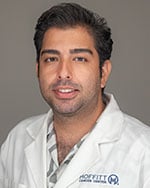 Amirreza
Amirreza
Our lab focuses on unraveling the crucial mechanistic roles of fucosylation in tumor biology. My research primarily revolves around investigating the impact of fucosylation on different aspects of dendritic cells and T cells biology. Through my research, I aspire to contribute to the development of novel immunotherapeutic strategies aimed at enhancing anti-tumor immune responses and improving patient outcomes.
Major Professor: Eric Le-Lau, PhD
 Anna
Anna
Major Professor: Undergoing rotations
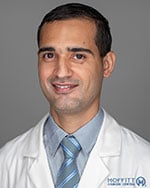 Ansar
Ansar
Major Professor: Undergoing rotations
 Athena
Athena
Major Professor: Undergoing rotations
 Avani
Avani
Our lab focuses on understanding p53 and its family members (p63 and p73). We aim to understand the complexity of this gene family to potentially design targeted therapies for cancer patients harboring mutations in the p53 family of genes. My research is focused on identifying the roles of long non-coding RNAs (IncRNAs) whose expression is controlled by TAp63 (p63 isoform) and correlates with breast cancer evolution and tumor grade.
Major Professor: Elsa Flores, PhD
 Bina
Bina
Emerging evidence shows that cancer-associated fibroblasts can provide a strong protection against targeted therapies. However, how this protection impacts the ultimate clinical relapse remains unclear. My thesis work aims at resolving this puzzle!
Major Professor: Andriy Marusyk, PhD
 Darwin
Darwin
We are currently looking at the role of mitochondrial unfolded protein response on melanoma and the tumor microenvironment. I also do bioinformatic analysis on genetic and transcriptomic data.
Major Professor: Paulo Rodriguez, PhD
 Devesh
Devesh
In the Gomes lab, we focus on how the aging process shapes the tumorigenic process. My research focuses on the role of circulatory changes in the aged host in modulating anti-cancer drug efficacy and therapy resistance.
Major Professor: Ana Gomes, PhD
 Ethan
Ethan
Major Professor: Undergoing rotations
 Hannah
Hannah
The Duckett lab is focused on identifying novel anti-cancer targets, developing small molecule probes against these targets, and interrogating how their altered signaling drives tumor progression, metastasis and therapy resistance. My research is focused on generating novel therapeutic approaches for the treatment of EWS fusion protein driven cancers.
Major Professor: Derek Duckett, PhD
 Hannah
Hannah
Major Professor: Undergoing rotations
 Jodie
Jodie
Our lab aims to identify novel genetic and epigenetic biomarkers of cancer that will inform the assessments of cancer risk, the detection of early-stage cancers, and the response and outcomes of patients. My current research focuses on characterizing cell-free DNA methylation signatures in prostate cancer patients to determine potential biomarkers that can inform predictions of treatment response and prognosis.
Major Professor: Liang Wang, MD, PhD
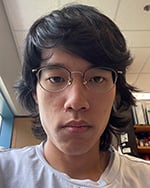 Juhyeon
Juhyeon
Research Interest: Cancer Biology
Major Professor: Uwe Rix, PhD
 Julia
Julia
My research aims to better understand how TBK1 drives oncogenesis in non-small cell lung cancer. My interests are focused on combining novel therapeutic strategies to target solid tumors with immune system engagement to enhance treatment efficacy and prevent resistance.
Major Professor: TBA
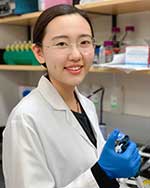 Kaizhen
Kaizhen
Research Interests: Molecular oncology, Gene regulation
Major Professor: Florian Karreth, PhD
 Karl
Karl
My research focuses on how the tumor microenvironment in the bone facilitate metastasis. I will specifically look at how mesenchymal stromal cells contribute to bone metastasis.
Major Professor: Conor Lynch, PhD
L e Jin
e Jin
Major Professor: Undergoing rotations
Maria
Major Professor: Undergoing rotations
 Marian
Marian
In the Brohl lab, we focus on the role of the chromosome 19 microRNA cluster (C19MC) in cancer, which is a group of 46 microRNAs spanning across 100 kb of the human genome. On the physiological level, this cluster is exclusively expressed in the placental tissue, where it acts as a regulator of trophoblast migration, as well as confers resistance to viral infection at the maternal-fetal interface. Additionally, this cluster has been hypothesized to act as an immunomodulatory unit, protecting the developing fetus from being seen as foreign by the mother’s immune system. In the oncogenic context, overexpression of this cluster has been found in some rare and difficult-to-treat pediatric cancers, as well as more common cancers, such as breast cancer, hepatocellular carcinoma, and melanoma. My research has two goals: 1) To define how overexpression of the cluster creates a tumor more fit to survive through changes to the tumor phenotype, and 2) to study the immunomodulation of T lymphocytes in the C19MC-overexpressed tumor microenvironment.
Major Professor: Andrew Brohl, MD
 Md. Asad
Md. Asad
Major Professor: Undergoing rotations
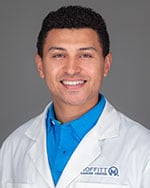 Mostafa
Mostafa
My research focuses on skeletal cancer dormancy and possible mechanisms that regulate the switch from dormancy to cancer activation.
Major Professor: Conor Lynch, PhD
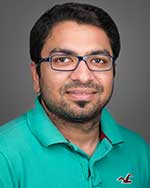 Neel
Neel
I am interested in understanding the molecular mechanisms underlying melanoma development and metastasis. I focus on signal transduction and the development of mouse models to understand melanomagenesis.
Major Professor: Florian Karreth, PhD
Nicol
 My Lab is focused on combining innovative mouse modeling strategies with various biochemistry and molecular biology techniques to characterize the interaction of non-coding RNAs and oncogenic signaling in tumor initiation, progression, metastasis, and drug resistance. In particular, my project is focused on studying the role of circular RNAs in melanoma development and progression.
My Lab is focused on combining innovative mouse modeling strategies with various biochemistry and molecular biology techniques to characterize the interaction of non-coding RNAs and oncogenic signaling in tumor initiation, progression, metastasis, and drug resistance. In particular, my project is focused on studying the role of circular RNAs in melanoma development and progression.
Major Professor: Florian Karreth, PhD
 Niveditha
Niveditha
My research focus lies in unraveling the mechanism of HDAC inhibitors in preventing Osteosarcoma. Also, understanding molecular interactions involved in bone metastatic cancers. I focus on epigenetics, signal transduction, mouse models of cancer metastasis and cancer therapeutics.
Major Professor: Conor Lynch, PhD
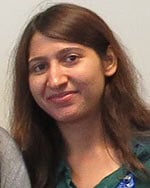 Payal
Payal
My research focuses on the toxicities associated with CAR T cell therapy. CAR T cell administration to patients exacerbates their cytokine milieu that leads to the onset of cytokine release syndrome (CRS) and immune cell-associated neurotoxicity (ICAN). My aim is to delineate the underlying mechanism behind these CAR T cell associated toxicities and explore the role of immune components such as regulatory T cells in this process.
Major Professor: Marco Davila, MD, PhD
 Pragya
Pragya
My research focuses on the role of inflammation in altering the sensitivity to targeted therapies.
Major Professor: Andriy Marusyk, PhD
 Rachael
Rachael
Major Professor: Undergoing rotations
Sae Bom
My research focuses on exploring chimeric antigen receptor (CAR) T- cell therapy to treat cancers. I focus on understanding of signal transduction triggered by CAR to ultimately design the efficient receptors with increased persistence and decreased exhaustion in vivo models of cancer.
Major Professor: Marco Davila, MD, PhD
